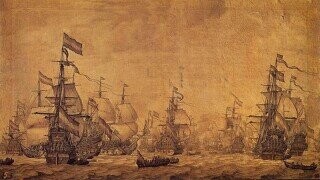The War That Lasted 335 Years (But Had No Casualties)

For 335 years, a war raged on in the background of global politics. “Fought” between the Netherlands and the Isles of Scilly, a tiny archipelago off of southwestern England, the 335 Years’ War resulted in no deaths, no injuries, and essentially no attention. Yeah, most people, even on the Isles of Scilly, had no idea this was going on.
Why did this unnoticed war even start in the first place? For context, we need to go back, appropriately, 335 years to the English Civil War. This conflict was fought between Parliamentarians loyal to Oliver Cromwell and Royalists loyal to King Charles I. As a civil war, this didn’t initially include the Dutch, but as time passed in the nearly decade-long war, it became clear that the Parliamentarians were going to win.
Seeing an opportunity to have good relations with the inevitable victor, the Dutch became allies with the Parliamentarians in the later stages of the war. To the British Royalists, the Dutch were traitors, and Royalists began attacking Dutch merchant ships in the English Channel.
Don't Miss
The Dutch had picked the winning side, though, as, by 1651, the war was on the verge of conclusion. Parliamentarians had taken control of almost all of the British mainland, and what remained of the Royalist navy had retreated to the Isles of Scilly. Seeing an easy opportunity to get some payback for the merchant ships, a fleet of twelve Dutch ships formed a blockade around Scilly. With this, the Dutch hoped to force the Royalists to pay them back for some of the damages done in the shipping attacks.
Seeing as the Royalist navy was already holding out on giving up when they had clearly lost the war, it’s not too surprising that they did not give in to the Dutch demands. When this happened, Dutch Admiral Maarten Tromp declared war on the Isles of Scilly on March 30, 1651. He chose to declare war on the archipelago rather than the Royalists or England as a whole because there was no other area that remained under Royalist control.

This declaration could have been the start of a brutal conflict between a weakened and desperate Royalist force against the vengeance-hungry Dutch … but this never happened. The Dutch blockade never fired on the Royalists, despite increasing pressure through the declaration. Then, months after the declaration, the Royalists finally surrendered, ending the English Civil War. With this, Scilly fell under Parliamentarian control. With no reason to keep up the blockade, Admiral Tromp and the rest of the Dutch blockade sailed away.
However, they never bothered to make peace with the Isles of Scilly before they left. This meant that the Netherlands remained in a state of war with tiny British islands. Surely, those on both sides constantly remained in a state of dread, terrified that the other might take the opportunity to finally attack.
Or, more realistically, no one was even noticed. Tromp’s declaration of war fell into obscurity. That was until 335 years later when a historian from the Isles of Scilly finally addressed the issue. On April 17, 1986, a Dutch ambassador traveled to the Isles of Scilly, and the two sides signed a peace treaty. More than three centuries after the declaration, one of the longest wars in history (even though it was hardly a war) had ended.
Did it ever really start, though? Some killjoys out there claim that the 33 Years’ War wasn’t ever a war at all, as Admiral Maarten Tromp didn’t have the authority to declare war. In this view, at best, he would’ve had to wait for approval from the Dutch government before the war with the Isles of Scilly was official.
Whether the war was or was not official, it lingered in an unresolved state for centuries before finally coming to a close. And now, no one has to worry about what would surely be a devastating fight between tiny islands and the Netherlands. Glad we dodged that bullet.
Top Image: Willem van de Velde the Elder/Wiki Commons